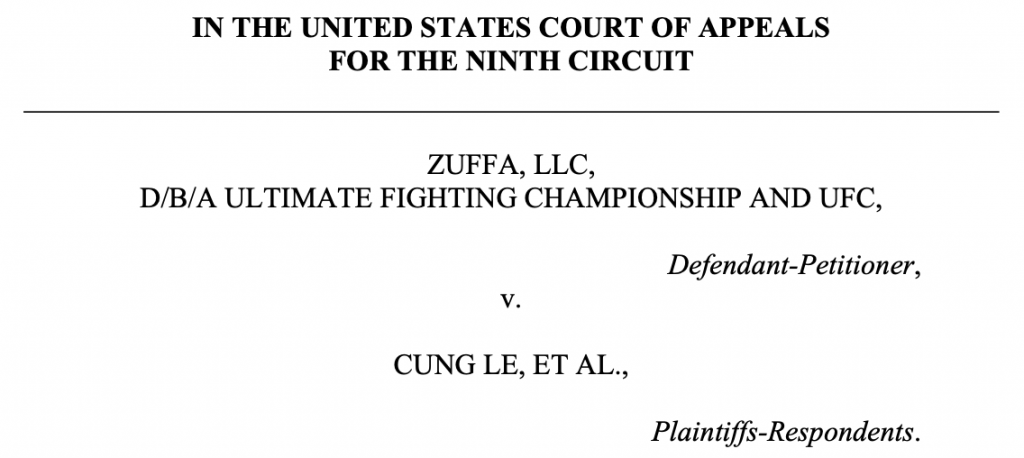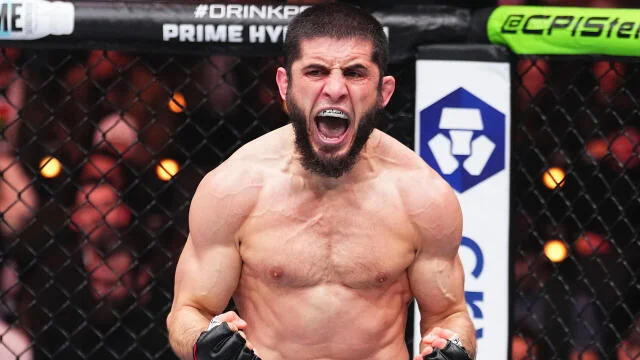Change On The Horizon? Judge Rejects UFC Antitrust Settlement

Amidst all of the typically busy furore of the world of combat sports, one of the biggest stories of the year has actually come from outside the Octagon, as opposed to within the confines of the cage; in fact, it has come from a Nevada courtroom, where the settlement (totalling $335 million) of a pair of class action lawsuits against Zuffa LLC, the parent company of the UFC has been rejected. Stay tuned to find out why this is so important, as well as the potential fallout from this case.
Context – Bringing us up to speed so far
In order to understand how we got here today, we have to take it back (way back). In fact, we have to take it back to 2014, when a group of former UFC fighters, including names such as Cung Le, Nathan Quarry, Jon Fitch and Kyle Kingsbury and hundreds of others, brought a class action lawsuit (Le v Zuffa LLC) (pay attention to this term, as it will be very important later), against Zuffa LLC, the parent company of the Ultimate Fighting Championship (UFC), covering a time period from 2010 until 2017. The second class action suit (Johnson v Zuffa), covers the timeframe from 2017 until the present day.
All of the above are co-plantiffs in the first class action lawsuit against the UFC and Zuffa LLC (Image Credit: UFC Class Action)
The lawsuit brought forward by the plaintiffs claims, at its core, that the UFC acts as an illegal monopoly by leveraging their dominance of their market power against their fighters by forcing them to sign exclusive contracts and holding down their pay. Brandon Ross, an analyst at LightShed Partners, estimates that the UFC’s media rights and sponsorship obligations were worth around 750 million for 2020 alone. Generally, the UFC’s roughly 600 fighters get around 20% of that market share combined.
This table highlights the actual fighter share of revenue from the UFC from 2010 through to 2017, the dates that this class action lawsuit covers. (Image Credit: Forbes)
So, why has this case been granted “class action” status?
At this point, I’m going to turn things over to Bloomberg News’ Josh Eidelson, who can explain this part much better and more eloquently than I can. In his article, “UFC Wants You to Watch Brawls, Not Its $5 Billion Lawsuit,”, Eidelson does an excellent job of outlining why this case meets all of the conditions of meriting class action status. In his article, Eidelson says that:
[UFC] “Its contracts could let the UFC profit from their fighters likeness in video games and trading cards without going back for permission. Fighters under the UFC banner also bear the costs of training camps, medical equipment, etc. because they were classified as independent contractors, like Uber drivers.There are a lot of legal contradictions here; UFC fighters…have been classified as independent contractors, yet the length/number of fights on their contracts is very extensive ,sometimes 2 or more years long.” Not only is there this glaring contradiction, but the fighters, as Eidelson points out, had to agree not to work for competitors. It would certainly appear that these former UFC fighters were dealt all of the negatives of being an independent contractor and received none of the benefits, hence why this class action lawsuit has been granted such status.
Bloomberg News’ Josh Eidelson has been a vocal and frequent reporter on the class action lawsuit against the UFC, and has interviewed many of the plaintiffs involved. (Image Credit: The Nation)
The latest (potentially huge) developments
So, what has happened since this suit was filed?
Well, as is normal in the legal world, the two sides have gone back-and-forth in court, arguing their respective sides of the case. Then, big developments started rolling in.
On March 13th, 2024, it was announced that Zuffa LLC had agreed to a settlement worth $335 million to close out both cases against the UFC. All sides were happy with the settlement, with everything appearing to be signed, sealed and delivered. All looked like it was going smooth and that the UFC was going to be able to go back to business as usual.
Until it wasn’t.
On July 31st, 2024, Judge Richard Boulware in Las Vegas rejected the settlement. Remember when I told you that the “class action” status of these cases was important to remember? Well, this is why. As part of any settlement in a class action lawsuit, the Judge presiding over the case has the final say/approval over whether the settlement is adequate/fair for all parties. Earlier in the case, Judge Boulware had raised concerns over the settlement amount between the two parties, specifically, how those funds would be equitably distributed amongst the class action plaintiff members.
What has been the reaction to the news?
Lawyers for the plaintiffs in both cases against the UFC have said that they are either open to continuing dialogue with Zuffa LLCs lawyers in order to obtain a settlement that satisfies the Judge, or they are happy to work towards a trial (more on this later).
Lawyers for the UFC released a statement disagreeing with the decision (naturally). They said that:
“We obviously disagree with this ruling.”
“As we have said throughout this process, we believe strongly in the merits of our cases and are evaluating all our options, including, without limitation, an appeal, and have initiated discussions with plaintiffs’ counsel who have expressed a willingness to engage in separate settlement discussions for the Le and Johnson cases.”
As you can imagine, Dana White didn’t exactly take the news…well.
Speaking with Yahoo! Sports’ Kevin Iole, White said this:
So, where do we go from here?
Obviously, the single biggest potential implication from this case is one thing – money.
Although he has not yet released his written reasons for rejecting the settlement, a big part of the Judge’s reasoning for refusing the settlement is likely because there is a feeling that the settlement sum is far too low. Many experts have predicted that, if the UFC were to lose at trial, settlement sums could run into the billions of dollars. It is likely that the UFC will have to return to the table with a much, much larger settlement offer in order to satisfy the Judge’s view of these class action suits.
The other likely implication of this case is in general business practice.

One way or another, proceedings within the District Court of Nevada are likely change the landscape of combat sports history, potentially forever. (Image Credit: District Court of Nevada)
What must then be considered is the utter significance of this litigation. Marshall Steinbaum, an Economics Professor at the University of Utah, is of the view that, “If we’re going to see one big labour antitrust showdown, this is a good place to look for it – this case essentially aims a pretty sharp spear at the heart of contemporary anti trust law.” This case is bound to have absolutely cataclysmic implications, regardless of where the judgement ultimately falls. If it falls for Zuffa, then it’s a validation of the current system. However if the plaintiffs win, then, like Nate Diaz after his win against Conor McGregor at UFC 196, it might truly just shake up the world of combat sports.
What’s next for the UFC/the Plaintiffs?
There is a status conference set for August 19th, with Judge Boulware setting a tentative trial date of October 28th in Nevada. Between now and then, the UFC and the plaintiffs in both cases can work towards a satisfactory settlement, or they can wait and take their chances at trial.
In Sin City – the glorious, glamorous gambling paradise, are the UFC willing to make the ultimate roll of the dice? We’ll simply have to wait and see to find out. But one way or another – this case is going to change the course of combat sports history, potentially forever.

[Scratches record] Yeah, that’s me. You’re probably wondering how I ended up here…or not. My name’s Keelin McNamara, and I am an AVID combat sports fan. Always have been, and probably always will be. I started writing and podcasting about MMA in the Summer of 2020 (yeah, we don’t talk about that here either). I’ve been doing it ever since, and have loved every single minute of it! Thanks for checking out whatever it is you’re reading – I hope you enjoy it!


